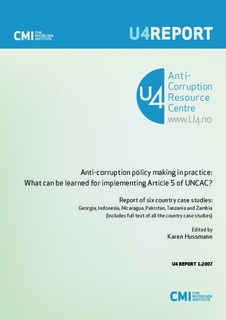Anti-corruption policy making in practice: What can be learned for implementing Article 5 of UNCAC?
Research report
Permanent lenke
http://hdl.handle.net/11250/2474589Utgivelsesdato
2007-01-01Metadata
Vis full innførselSamlinger
- Publications [1480]
Originalversjon
Bergen: Chr. Michelsen Institute (U4 Report 2007:1) 237 p.Sammendrag
Fighting corruption is a challenge in any context, because corruption has many faces and can occur in different forms across all sectors and institutions of a country. The UN Convention against Corruption (UNCAC) recognises this and calls, among others, for "effective, coordinated anti-corruption policies" (Article 5) to address the problem strategically. This report explores what form such an approach could take, and examines in depth how national anti-corruption policies or strategies have come into being in six countries: Georgia, Indonesia, Nicaragua, Pakistan, Tanzania and Zambia. From a public policy perspective the authors look specifically at the catalysts and driving forces, how reforms were selected, prioritised and implemented, and finally, what role development partners played in the overall process. The country studies show that the political response to perceived widespread corruption in those countries often consisted in the development of a broad national anti-corruption policy or strategy. Nevertheless, this approach has not been overly successful for a variety of reasons, ranging from unrealistic planning and the lack of prioritising reforms, to serious shortcomings in the implementation arrangements, and the absence of vital political agreements for effective reforms. The report argues that explicit anti-corruption policies and strategies are not necessarily the most suitable and certainly not the only way to implement Article 5 of UNCAC, and goes on to discuss other options for coordinated anti-corruption policies. The report also points to the need of pursuing anti-corruption work with effective and modest targets instead of ambitious but unfeasible promises.
